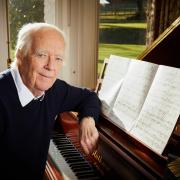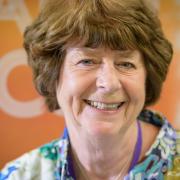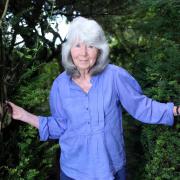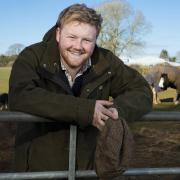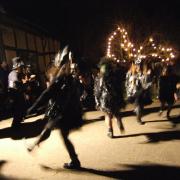Marion Chesney is also known as MC Beaton, the successful author behind both the Agatha Raisin murder mystery series and the Highland detective Hamish Macbeth. Katie Jarvis went to meet her.
Marion Chesney sinks into a comfy settee at the Lygon Arms in Broadway with an air of relief. No one’s rioting. There’s not a trace of tear gas in the air.
…Unlike in Istanbul, her favourite city, from which she’s recently returned. “We got caught in a riot protesting against the IMF. One of those organised riots. They come from America; they come from Germany: the very hard left.”Must have been pretty scary?
“Not really,” she says, in her surprisingly soft Glaswegian accent. “It was like watching something on television. You know – when you’re not quite there. We managed to get up a side street out of the way, but there was tear gas in the air.”
It conjures up an extraordinary scene; this most elegant of ladies, charging up a street to avoid a riot. But you don’t need tear gas and water cannon to be entertained by Marion Chesney: even the downright ordinary is turned into a hoot during a conversation with this prolific author. She tells of her flight back, where she was alerted to the economy class desk by the illuminated sign ‘Common People’. And then there was her recent engagement at Guildford Book Festival. “Unfortunately, I’d just had three root canals done so I was feeling not very tactful.
"Someone in the audience asked, ‘Don’t you find it rather tasteless to make fun of murder?’ And because my teeth were aching, I said, ‘I don’t care! Kill �them all!’
It’s the kind of response you might expect from someone else, too: detective Agatha Raisin, who lives in the fictional Cotswold village of Carsely. She’s Marion’s most famous, least PC, character, created under the pen name MC Beaton. Is there much in common between author and black-coffee drinking, smoker Agatha. “Well,” Marion says, sipping her coffee, cigarettes tucked firmly into bag, “Agatha behaves the way I would like to behave sometimes. And, of course, in this increasingly politically-correct world, I become more impatient. For example, Agatha smokes. They bring in the smoking ban and country pubs start closing down one after the other. Even the papers say it’s because of cheap booze from the supermarkets. Well, they had cheap booze in the supermarkets before the smoking ban.”
So Agatha is a form of rebellion?
“Definitely, yes. In a book I’ve just finished, I killed off a health and safety executive,” she adds, with a wry (yet dangerous) glint in her eye.
And that’s far from where similarities end. Agatha, too, has recently returned from Istanbul in her latest murder mystery There Goes the Bride. She may not have encountered IMF protestors, but she did see something much more alarming: her ex-husband James, for whom she reluctantly still holds a flame, with his new bimbo fianc�e, Felicity. A fianc�e who morphs from stunner to stiff in the flash of a thigh.
“Agatha’s trip to Istanbul is based on an adventure my husband, Harry, had with his friend Erol Fehim, who appears in the book. They decided to take a ferry from Istanbul to the Crimea to see the battlefields. They had a terrible job finding the ship and, when they did, it was a Russian rust bucket. And they could hardly get to their cabin because it was full of mattresses and shopping: the ship was used by women from the Ukraine to go on shopping trips. Something similar happens to Agatha.”
Reading through Agatha’s own website, it becomes clear just how much readers identify with this endearing former PR executive who – alongside solving crimes – rails against aging and yearns for what she cannot have. “Would love Agatha as a friend,” says one fan. “I really want Agatha and James to be together,” repines another. Will that ever come to pass?“Ah well, I don’t know. I can only say that’s a dangerous thing to do. It’s like the Frasier series on television when Niles marries Daphne: it was the end of the cliffhanger; you had a feeling there was nothing left.”
That’s probably just a technical hitch. Because in truth, there’s nothing Marion likes better than a happy ending. It was the unsatisfactory nature of reality that got her into writing in the first place. She doesn’t talk much about her earliest years – “You can’t blame the parents for everything. You need to grow up. Move on” – but they clearly couldn’t be categorized under ‘idyllic’. Instead, the young Marion haunted libraries (“palaces of dreams”), peopling her world with dependable characters conjured by Muriel Spark, Ian Fleming, Agatha Christie, JRR Tolkien, Nevil Shute, Rose Macaulay – “just one damn good author after another”. In this particular universe, you could reward the just, punish the evil, and achieve perfection with the words ‘The End’. Unlike in real life, of course.
Take, for example, the humiliating episode that occurred when she was a young girl working in a bookshop in Glasgow. “There was a very pretty actress ‘resting’ in the bookshop who used to take me over to The Citizens’ Theatre, where we’d have coffee with the actors afterwards: I was stage struck. She moved on but there was a posh girl working with me who I was very anxious to impress. I told her about having coffee with these actors and offered to take her over. It was Henry IV part 2 and I went backstage afterwards and met Fulton Mackay and John Grieve, who told me, ‘We’re not going for coffee tonight, Marion; we’ve got a union meeting.’ So this girl and I went to the caf� next door by ourselves. Ten minutes later, the actors all walked in. Of course, me with the pretty actress was something; whereas me on my own was nobody.”
Clearly, the only way to correct this state of affairs was to take matters – and pen – in hand. And that really is an ambition she achieved in fairytale fashion. When a customer walked in one day wanting a cookery book for a bachelor who couldn’t boil an egg, Marion told her not to waste her money: to get, instead, a government publication called the ABC of Cookery. As in all the best stories, it turned out the mystery woman worked for the Scottish Daily Mail and was urgently seeking a theatre critic to cover a pantomime, “because the editor’s nephew was one of the ugly sisters”.
“She said to me ‘Have you had anything published?’ and I just lied: ‘Oh yes! In Punch and the Spectator but it’s at home and I haven’t time to go and get it. “She said, ‘Well you can’t go wrong if you mention the editor’s nephew’.
“So I phoned in my review and thought that was my moment of glory gone. And then the next Monday, the office boy from the Daily Mail turned up with tickets for the Glasgow Empire.”
She rose pretty spectacularly through the ranks, via fashion editorship on Scottish Field to reporter on the Scottish Daily Express. “It was vicious reporting. At the time, Glasgow had razor gangs and the worst slums in Western Europe. Sometimes, my driver wouldn’t even come up the stairs with me. It’s drugs now, but then it was drink: methylated spirits; surgical spirit. We were often there before the police arrived.”
Marion stuck it for a few years before, sick of the brutality, she moved to Fleet Street, ending up as chief woman reporter on the Daily Express. “It had a daily circulation of 4.5 million so you had to be good. Anne Robinson still refers to me as the Byline Queen.
“I’d walk down Fleet Street, particularly when I was on the night shift, and see St Paul’s lit up, smell the hot metal, and think I’d arrived. But once Beaverbrook died, the accountants took over and it was no longer a case of ‘No matter what it costs, get it on the front page’.”
She met the Beatles, Malcolm Sargent, Lady Churchill. She was the first reporter on the Profumo case. “I was supposed to go to Profumo’s residence in Regent’s Park and get his wife, Valerie Hobson, to one side and say, ‘What do you think about your husband shacking up with a cabinet whore?’ When the butler answered the door and said politely they were out, I could have kissed him with relief.”
She met her husband, Harry Scott Gibbons – still her best friend and chief encourager – when he was Middle East correspondent on the paper. When their son, Charles, was six months old, they moved to the States where, in good times, they worked on papers including Murdoch’s New York Post and the Star; and, when times were harder, washing dishes 12 hours a day and waiting at tables.
“It was during this period that I’d started reading Georgette Heyer Regencies. I said to my husband, ‘This is rubbish: the speech is wrong; the clothes are wrong.’ And he said, ‘Why don’t you write them, then?’” Before she’d even finished the first, she got an offer from a publisher – but asking her, instead, to turn out an Edwardian romance. Thus began the next phase of her career, as writer of more than 100 historical novels under pseudonyms such as Ann Fairfax, Jennie Tremaine and Charlotte Ward. Apart from thumpingly good stories, they’re characterised by their accuracy. One of her greatest finds, Marion says, was an old stagecoach directory of routes out of London: where they stopped; the name of the posting houses; what they looked like inside; the name of the landlords; how much you tipped the coachman. “Does detail matter? Yes, it does. People can sense if something’s wrong.”
But it’s her two detective series – Agatha and Hamish Macbeth – that have put her name up in lights. Laid-back police officer Hamish was ‘born’ in the 1980s when Marion and Harry moved from New York to Sutherland. “The area had a tremendous impact on me because of the scenery. It was so hard to believe there was somewhere in Britain that is miles and miles of nothing. We had an old croft house, which was built next to Neolithic ruins.
The dog was a Brooklyn dog and he hated the countryside. I had to take him in the car down to concrete to cheer him up.
“What I discovered was that there are two types of Highland character, totally different from the lowland Scot. There are the cowboys, who are envious about anybody getting on. My husband had a flock of black sheep whose lambs took top prize at the sheep fair; so they cut the fence and put in a white ram to spoil the flock.
“On other side of the Highlander, you get the ‘gentle’, on which Hamish Macbeth was based: no side to them because they consider themselves as good as anyone in the world; nicest accent in the region; an innate politeness.”
Despite the fact that it’s hardly a high-crime region – there’s been scarcely a murder in Sutherland for the past 100 years - Hamish materialised, she says, because the area had such an impact on her. And the same is true of Agatha, whose home in the Cotswold village of Carsely equally defines her. Marion and Harry moved to Blockley because they thought it would be convenient for when Charles went to Oxford (in fact, he went to Cambridge). For Agatha, it was memories of a childhood holiday in the Cotswolds that tempted her back.
For both of them – city girls at heart – the move has been a revelation. “The place where I set my books dictates my story. In the first book, Agatha had the same feeling as me: a city person coming to the Cotswolds. You look up at the hills in winter when it’s foggy and you feel there’s a splendid party to which you haven’t been invited. And then you go up to London and you don’t fit in there any more. Suddenly, you can’t wait to get back on the train again. And going down into Blockley, there is this tunnel of trees arching over the road, and it’s like plunging into a burrow; a feeling of protection. I’ve never felt anything like it before.”
That’s the Cotswolds: welcoming, friendly and safe. As long as you’re not Agatha Raisin, that is…
MC Beaton’s latest books are Agatha Raisin: There Goes the Bride (�14.99) and Hamish Macbeth mystery, A Highland Christmas (�9.99), both published in hardback by Robinson. For more information about both series, log onto www.agatharaisin.com



